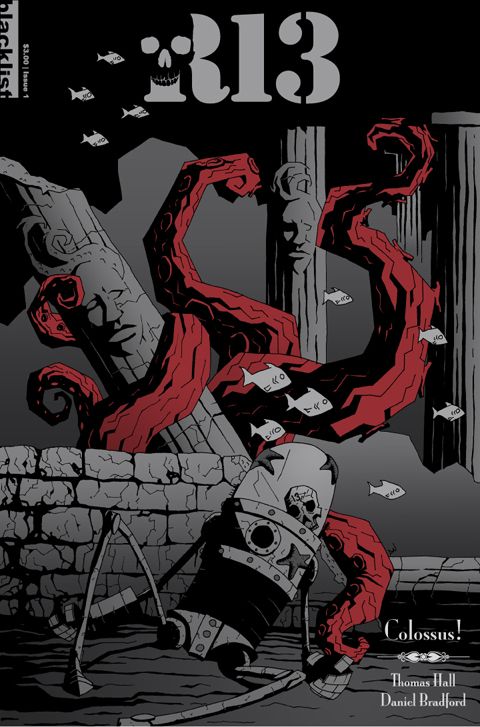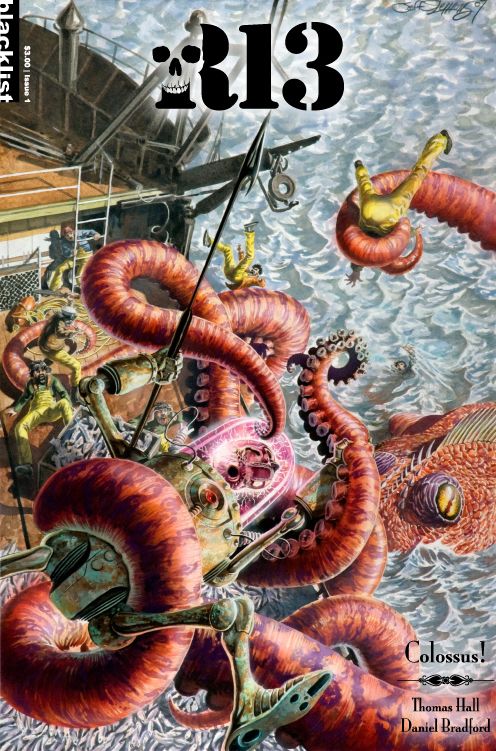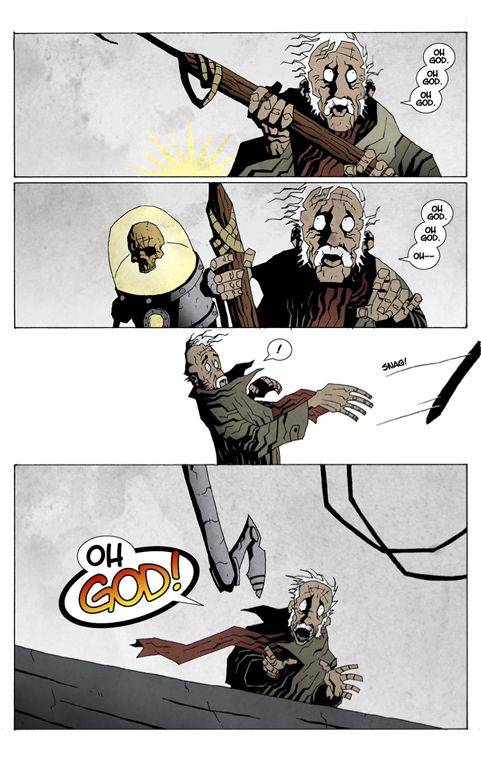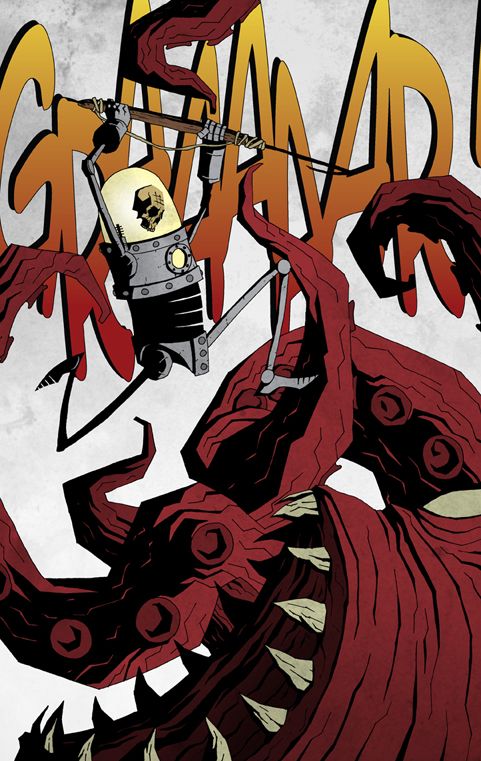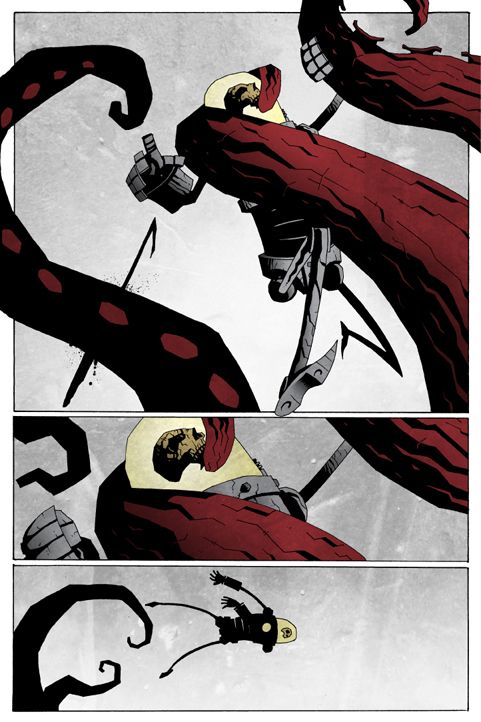Writer Thomas Hall and artist Daniel Bradford have worked together since 2003, and in a few short weeks they'll publish a new title that really caught my eye when I received an email about it. Making its debut at the 2009 MoCCA Festival, which is presented every year by the Museum of Comic and Cartoon Art in New York, is the first issue of Robot 13. It's the story of an amnesiac robot who fights mythological creatures of destruction.
With a title like that, how could I not do an interview with Hall to find out more about Robot 13?
JK: Thanks for taking the time to chat with me. Can you give us a little bit of info on your background, like how you got into comics and when you decided you wanted to write them?
Tom: As far back as I can remember, I have always loved comics. Like a lot of kids, the first comics I ever had were given to me- some Archies, a few Legion of Superheroes books and a few Marvel books. One that I was obsessed with was an issue of the Incredible Hulk by John Buscema. I was three, and I stared at that thing all the time, and I don't know to this day exactly why. My dad read it to me, and I asked him how he knew what everyone was saying. He explained word balloons to me, and being three and naive, I asked him where the words came from. When he told me that it was someone's job to write comics, even at three it just blew my mind. From that point on, I wanted to be a writer of some kind.
As I got older, I thought that doing comics would be great, but I wasn't sure that it was realistic. In high school, I discovered mini-comics, and I started making my own with my brother and photocopying them and selling them to kids in school. By the time I was in college, I met a few people who were into making their own comics, so I got into doing DiY stuff- I was in some anthologies, and I was writing and drawing and doing whatever I could in my spare time to do comics. Around that time, the Internet was just starting to become a way people started to connect and do comics, so I started finding people all over who did their own thing, and my interest continued.
When I met Daniel, though, I found someone who shared the same drive I did and who I got along with and saw eye to eye with creatively. That's where everything gelled, and we decided to make a serious push to do comics in a more serious and professional way than I had up to that point. It was all a learning experience, though. I had to follow that journey and make a lot of bad comics and a few not so bad ones to grow to where I am. And I am still learning. We all do, I guess.
JK: How did you and artist Daniel Bradford meet?
Thomas: Daniel did a comic that I saw online and really loved. I thought he HAD to be a professional, so I wrote him basically a fan letter, and I told him how great his comic was and I slipped in there that I would love to write something for him. Little did I know that he had done far less in the way of comics than I had at that point, and he had read something I did and was interested in working with ME. We talked about what we wanted to do, and the kinds of influences we had, and we started to get to work. But the first two years we worked together, everything was emails and phone calls. We didn't meet until the San Diego Comic Con in 2005. It's amazing how closely you can work with someone on opposite sides of the country.
JK: What do you do when you aren't making comics? Do you have a day job?
Thomas: I am a purchasing agent for an architectural lighting company. I buy all the parts and pieces that make up our lighting fixtures. It's a totally different job than writing comics, but it's a lot of dealing with vendors, solving problems and negotiating... it's different every day, and it's a good “alter ego” for me to have outside of comics.
JK: The art, and the story too actually, in the first issue of Robot 13 seem to be influenced by Mike Mignola's work. Who else would you consider an influence, on the book and on your writing in general?
Thomas: Every time I write a story, I like to sit down and do some research. Robot 13 was influenced by a number of things-- Greek mythology was a big part, as was Mary Shelley, but there were some movie influences as well. Ray Harryhausen was big, as were some of the Gojira movies. I am a massive fan of that stuff-- it's amazing to me how well-written some of the original films were. Our dubbed versions don't do the Japanese movies justice, because they were more concerned with moving the story along rather than being accurate to the original intent of the stories. Originally, I wanted to name him “Robot 13” because it had the sound of something from a Japanese sci-fi movie.
As far as my writing in general-- I guess I like a lot of older writers. Edgar Allen Poe, Gerard Manley Hopkins, Flannery O'Connor ... I like good writers who really know how to bend words to do their will. It's inspiring.
JK: How have you been publicizing the book? You guys have a table at MoCCA, right?
Thomas: Well, it used to be that there were a handful of main print sources for comics information, and if you wanted to publicize your book and have people know about it, you had to get their attention. Today, those things still exist, but the internet has made everything far less centralized and free flowing. Yes, there are “big” sites, and we have reached out to many of them and we have been getting a great response so far, but there are SO many avenues out there now. We have made ourselves available to a lot of the podcasts and blogs out there who have been interested, and will keep doing that. We have our own website, and Robot 13 has it's own Myspace page and a ComicSpace page, and you can even follow Robot 13 on Twitter. We are using everything at our disposal to get the word out.
Internet aside, we are also making appearances. MoCCA will be a big one this year- we will have a table where people can be the first anywhere to get Robot 13, along with other Robot 13 stuff and some of Daniel's artwork and prints. We plan on doing some West Coast shows as well. Things will be busy for Blacklist Studios, you can be sure.
JK: And finally, it's a question we've been asked ... what happened to the other 12 robots?
Thomas: Our story has evolved since we started working on Robot 13 over a year ago. In our early drafts, yes, we did intent for Robot 13 to be one in a series of robots which had been developed. There would have been a battle between Robot 13 and the “new” model Robot 23, but things have totally changed. We scrapped the whole back story and came up with something we like far better.
In the current incarnation, the “13” means something far different. It's a marking on his forehead and not a model number. How that marking got there and what it means is part of the secret of who Robot 13 is. I'd love to tell you more about that, but I can't spoil the surprise.


